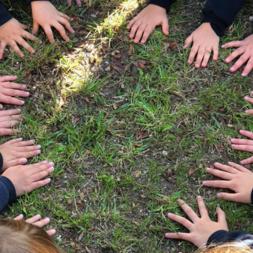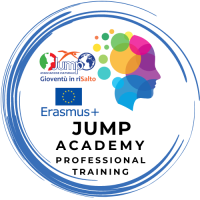
OUTDOOR EDUCATION To Improve Pupils’ Participation And Prevent School Drop-Out
Outdoor education is an innovative teaching method in which daily school moments are carried out of the classroom and into your neighborhood or a local area of interest. Outdoor learning implies regular and purpose-driven activities outside of the class.
O.E. has now a literature with theories and practices, manuals and research, new experiences and examples of existing networks.
Description
More info here https://associazionejump.it/course/outdoor-education/
Outdoor Education brings learning outside the classroom into local environments, making lessons hands-on, creative, and inclusive. This course introduces teachers to the theory and practice of outdoor learning, linking indoor and outdoor activities across all subjects. Participants explore nature, public spaces, and schools in Soverato, applying non-formal methods to engage students through movement, curiosity, and direct experience. Activities focus on environmental awareness, inclusion, creativity, and motivation - core values of the EU Green Deal and lifelong learning. Teachers will gain tools to design lesson plans, adapt to diverse learners, and fight school dropout. Outdoor learning improves mental health, connection with nature, and curriculum outcomes. This training helps educators leave the comfort zone and rediscover the joy of learning through real-world experiences.
Learning objectives
- Understanding different terms, definitions and approaches in the literature of outdoor education/outdoor learning, experiential, adventure learning
- Learning about the European and the global framework, the EU documents and guidelines and the connection with the Green Deal
- Experiencing tools and methods using concretely outdoor activities learning with other teachers
- Understanding the differences of the target groups, benefits of using outdoor education, especially fighting drop out and ensuring inclusion
- Developing different types of lesson plans experimenting creativity, critical thinking and working in nature
Methodology & assessment
Furthermore, in line with the JUMP Academy method, our courses are based on a strategic balance between formal and non-formal education, indoor and outdoor education and the team takes care of a very important aspect of international mobility which is the intercultural learning which we develop with short excursions and facilitating the interaction with local partners, businesses and citizens of our territory. Each local context has its own economy so it’s always useful, in training programs, to get in contact with concrete examples (experiential learning and real based learning).
We always try to connect our learners to local teachers and students to cooperate in developing innovation and networking for future projects.
Materials, digital tools & other learning resources
JUMP provides, after the completion of the course, all presentations, training materials and any other digital and learning tools used during the training sessions. Furthermore, extra materials are sent if there are updates and new ones researched afterwards.
Certification details
At the end of the training, JUMP delivers a formal certificate of attendance and the team is at the disposal to fill the Europass certification document according to the EU model template and other needed documents for reporting to the sending institution.
Our courses are in line with the Erasmus+ Quality standards for courses under Key Action 1 (learning mobility of individuals)
Pricing, packages and other information
-
Course package content:
In the course fee are included: organization, administration, trainers' costs and classes, further training/learning materials, certification, support of the team H24, photo-video reporting.
Extra costs are referred to logistics. JUMP is sending all the precise info when the participants or the Erasmus coordinator ask for information.
-
Additional information:Description of the services and activities included in the course package (such as accommodation, meals, transport) or available at extra cost.
-
Cancellation & changes:
With a proper time in advance is possible to cancel the participation, informing and explaining the motivation.
-
Additional information:The options and conditions for change and cancellation, and the policy in case of unforeseen circumstances (force majeure).
Additional information
-
Language:English
-
Target audience ISCED:Early childhood education (ISCED 0)Primary education (ISCED 1)Lower secondary education (ISCED 2)
-
Target audience type:TeacherHead Teacher / PrincipalTeacher Educator
-
Learning time:25 hours or more
Upcoming sessions
Past sessions
More courses by this organiser

COMMUNICATION IN THE NEW MULTICULTURAL SOCIETY. Understanding How Language Works To Improve Our Communication And Relationships With Others

ENTREPRENEURSHIP / FINANCIAL EDUCATION. Building Sustainability From Schools To The Labor Market



